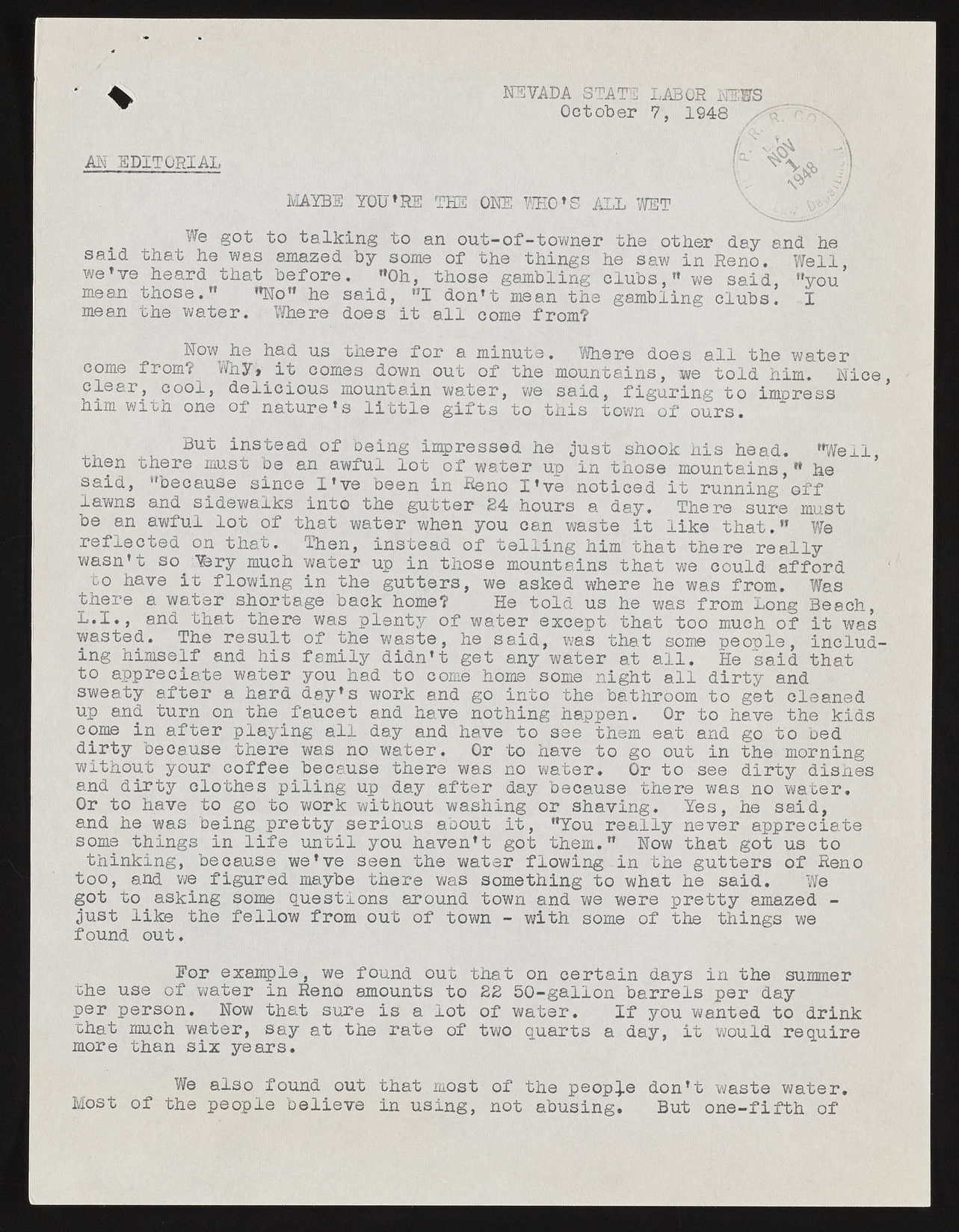Copyright & Fair-use Agreement
UNLV Special Collections provides copies of materials to facilitate private study, scholarship, or research. Material not in the public domain may be used according to fair use of copyrighted materials as defined by copyright law. Please cite us.
Please note that UNLV may not own the copyright to these materials and cannot provide permission to publish or distribute materials when UNLV is not the copyright holder. The user is solely responsible for determining the copyright status of materials and obtaining permission to use material from the copyright holder and for determining whether any permissions relating to any other rights are necessary for the intended use, and for obtaining all required permissions beyond that allowed by fair use.
Read more about our reproduction and use policy.
I agree.Information
Digital ID
Permalink
Details
Member of
More Info
Rights
Digital Provenance
Publisher
Transcription
1 * NEVADA STATE LABOR NEWS October 7, 1948 / AN EDITORIAL We got to talking to an out-of-towner the other day and he said that he was amazed by some of the things he saw in Reno. Well, w e ’ve heard that before. "Oh, those gambling clubs," we said, "you mean those." "No" he said, "X d o n ’t mean the gambling clubs. I mean, the water. Mhe.re does it all come from? come from? W h y , _it comes down out of the mountains, we told him. Nice, clear, cool, delicious mountain water, we said, figuring to impress him with one of nature’s little gifts to this town of ours. then there must ce an awful lot of water up In those mountains," he said, "because since I ’ve been in Reno I ’ve noticed it running off lawns and sidewalks into the gutter 24 hours a day. There sure must be an awful lot of that water when you can waste it like that.” We reflected on that. Then, instead of telling h i m that there really w a s n ’t so Vbry much water up in those mountains that we could afford to have it flowing in the gutters, we asked where he was from. Was there a water shortage back home? He told us he was from Long Beach, •L.I., and that there was plenty of water except that too much of it was wasted. The result of the waste, he said, was that some pe o p l e , including himself and his family did n ’t get any water at all. He said that to appreciate water you had to come home some night all dirty and sweaty after a hard d a y ’s work and go into the bathroom to get cleaned up and turn on the faucet and have nothing happen. Or to have the kids come in after playing all day and have to see them eat and go to bed dirty because there was no water. Or to have to go out in the morning without your coffee because there was no water. Or to see dirty dishes and dirty clothes piling up day after day because there was no water. Or to have to go to work without washing or shaving. Yes, he said, and he was being pretty serious about it, "You really never appreciate some things in life until you h a v e n ’t got them." Now that got us to thinking, because w e ’ve seen the water flowing.in the gutters of Reno too, and we figured maybe there was something to what he said. We got to asking some questions around town and we were pretty amazed - just like the fellow from out of town - with some of the things we found out. For example, we found out that on certain days in the summer the use of water in Reno amounts to 22 50-gallon barrels per day per person. Now that sure is a lot of water. If you wanted to drink that much water, say at the rate of two quarts a day, it would require more than six years. We also found out that most of the people d o n ’t waste water. Most of the people believe in using, not abusing. But one-fifth of Now he had us there for a minute. Where does all the water But instead of being impressed he just shook his head. "Well,

